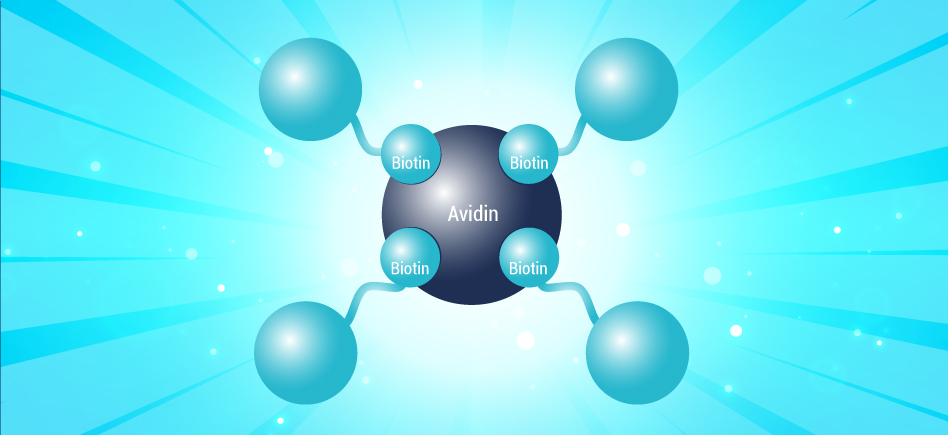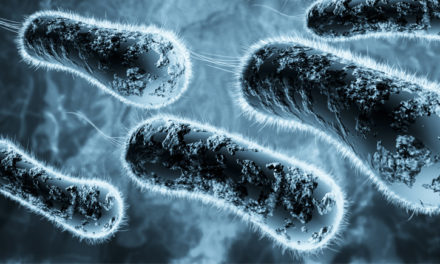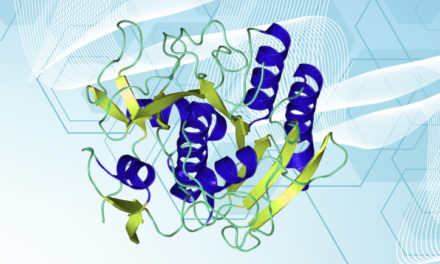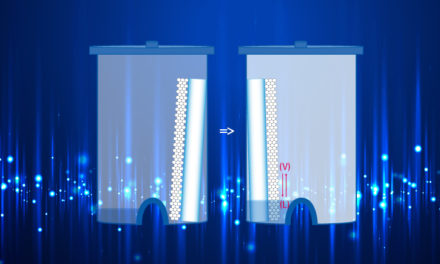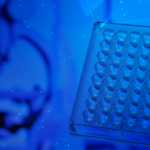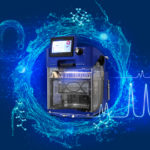The specific interaction between biotin and avidin (streptavidin) makes it an excellent tool to facilitate the detection, purification, and immobilization of the proteins.
This versatile technology is adopted in a diverse range of applications:
- ELISA for protein quantification,
- FACS to detect/isolate cells,
- Biopanning for the selection of phage display,
- SPR to study protein binding kinetics,
- Immuno-capture and Enrichment to isolate antibodies from plasma or other biological fluid.
However high quality biotinylated proteins presents a major challenge to generate. To overcome the technical issues as insufficient labeling, high batch-to-batch variation, and unpredictable performance, ACROBiosystems has developed an exclusive collection of pre-labeled and experimentally validated biotinylated recombinant proteins. The MABsol® biotinylated protein collection includes more than a hundred commonly studied drug targets and biomarker proteins. These high quality recombinant proteins are closest to natural conformation and modification as starting materials. The biotinylated protein collection includes two unique and complimentary product series:
1. PrecisionAvi series with ready-to-use Avitag™ technology – a unique 15 amino acid peptide
 |
This single-point enzymatic labeling technique brings many advantages for commonly used binding assays.
|
2. UltraLys series with in-house developed chemical biotin labeling method for Ultra detection sensitivity
 |
|
Key Features
1. Closest to Natural Conformation and Modification
The production of the biotinylated proteins is carried out using the proprietary HEKMax® expression platform. As expression hosts, the human HEK293 cells have a variety of advantages compared to other cell types as summarized in the table below.
| Expression systems | Folding | Phosphorylation | Proteolytic processing | Glycosylation |
| E. Coli | + | N/A | N/A | N/A |
| Insect Cell | ++ | ++ | ++ | Poor |
| Plant Cell | +++ | +++ | +++ | Poor |
| CHO Cell | ++++ | ++++ | ++++ | Non-Human Like |
| Human Cell | +++++ | +++++ | +++++ | Human authentic |
2. High Bioactivity & Detection Sensitivity
The bioactivity of biotinylated proteins is determined both by the structure of the protein itself, and by the way how biotinylation is performed. For every single protein, multiple options of tags and biotinylation methods are tested. And the products are evaluated in a variety of binding assays. Only those with the best performance are selected for production. Figure 1 is an example of the internal evaluation experiments.
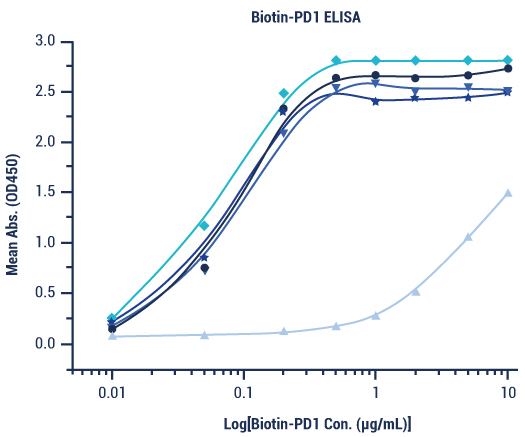 Fig. 1 Binding activity of different forms of biotinylated PD-1 evaluated in a functional ELISA against rhPD-L1 (Cat. No. PD1-H5258 )
Fig. 1 Binding activity of different forms of biotinylated PD-1 evaluated in a functional ELISA against rhPD-L1 (Cat. No. PD1-H5258 )
These biotinylated proteins demonstrate high bioactivity and superb detection sensitivity in different application. In functional ELISA, the biotinylated human BCMA has high binding activity with BAFF as showed in figure 2. Figure 3 shows that the biotinylated PD-1 can be well applied to AlphaLISA to detect the binding activity with its ligand PD-L2. The figure 4 shows that the biotinylated protein can be easily used for determining the affinity between protein and therapeutic antibody in SPR assay. Also, the biotinylated proteins are often used in cell based assay, such as cytotoxicity assay and evaluation of CAR expression (Fig. 5 & Fig. 10).
ELISA
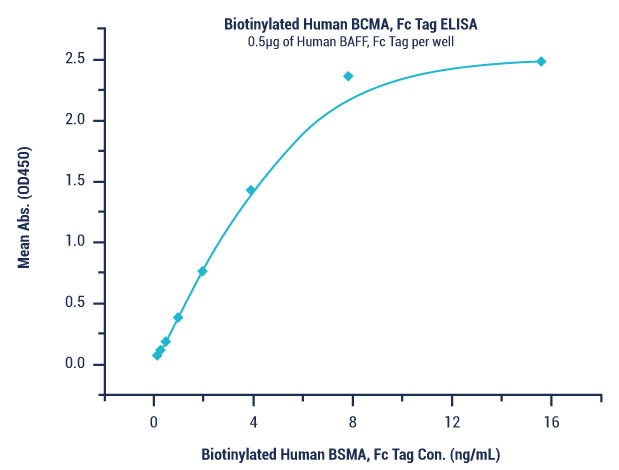 Fig. 2 Immobilized Human BAFF, Fc Tag (Cat. No. BAF-H4268) at 5μg/mL (100μL/well) can bind Biotinylated Human BCMA, Fc Tag Cat.No. BC7-H82F0) with a linear range of 0.12-1.95ng/mL.
Fig. 2 Immobilized Human BAFF, Fc Tag (Cat. No. BAF-H4268) at 5μg/mL (100μL/well) can bind Biotinylated Human BCMA, Fc Tag Cat.No. BC7-H82F0) with a linear range of 0.12-1.95ng/mL.
AlphaLISA
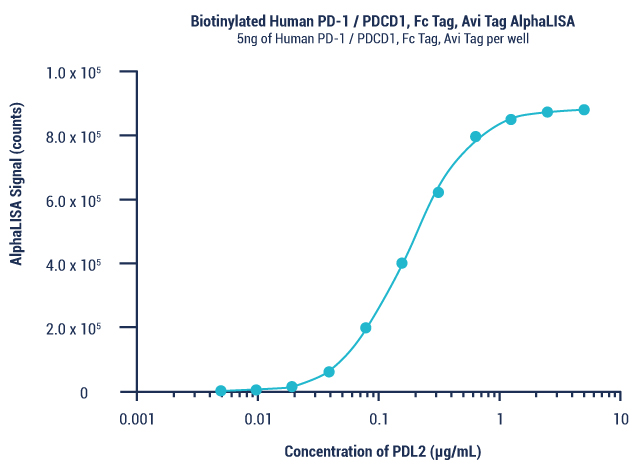 Fig. 3 Biotinylated Human PD-1 (Cat. No. PD1-H82F1) at 1μg/mL (5μL/well) can bind Human PD-L2 (Cat. No. PD2-H5220) with a linear range of 0.02-0.625μg/mL.
Fig. 3 Biotinylated Human PD-1 (Cat. No. PD1-H82F1) at 1μg/mL (5μL/well) can bind Human PD-L2 (Cat. No. PD2-H5220) with a linear range of 0.02-0.625μg/mL.
SPR
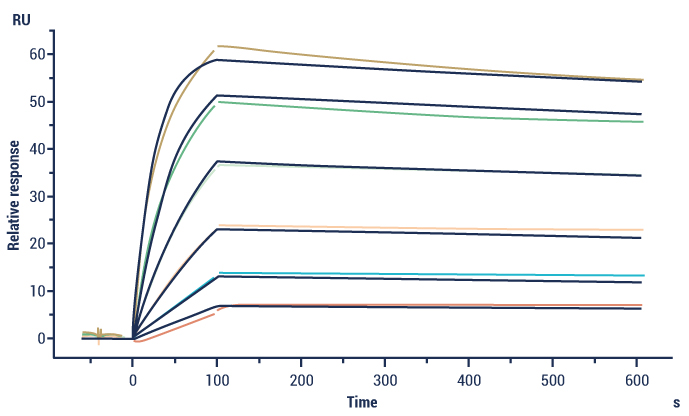 Fig.4 The affinity constant of human CD19 protein was 0.255nM as verified by SPR Biotinylated Human CD19 (20-291), His,Avitag (Cat. No. CD9-H82E9) captured on Biotin CAP – Series S sensor Chip can bind FMC63 MAb (mouse lgG2a) with an affinity constant of 0.255nM as determined in a SPR assay (Biacore 8K) (QC tested).
Fig.4 The affinity constant of human CD19 protein was 0.255nM as verified by SPR Biotinylated Human CD19 (20-291), His,Avitag (Cat. No. CD9-H82E9) captured on Biotin CAP – Series S sensor Chip can bind FMC63 MAb (mouse lgG2a) with an affinity constant of 0.255nM as determined in a SPR assay (Biacore 8K) (QC tested).
Cell based assay
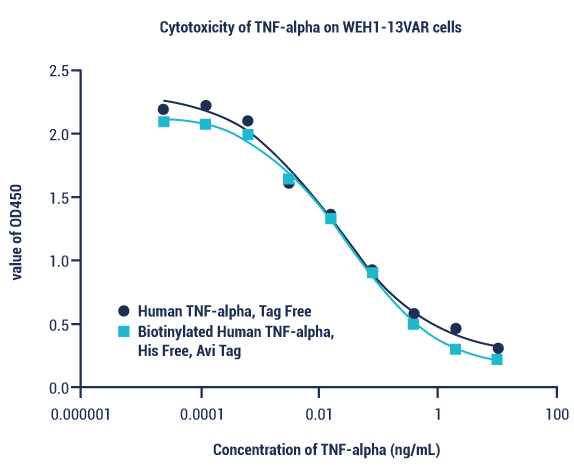 Fig. 5 Recombinant human TNF-alpha (Cat. No. TNA-H82E3) induces cytotoxicity effect on the WEH1-13VAR cells in the presence of the metabolic inhibitor actinomycin D. The EC50 for this effect is 0.014-0.029 ng/ml. The result shows that the biotinylated human TNF-alpha is consistent with naked TNF-alpha in cytotoxicity assay.
Fig. 5 Recombinant human TNF-alpha (Cat. No. TNA-H82E3) induces cytotoxicity effect on the WEH1-13VAR cells in the presence of the metabolic inhibitor actinomycin D. The EC50 for this effect is 0.014-0.029 ng/ml. The result shows that the biotinylated human TNF-alpha is consistent with naked TNF-alpha in cytotoxicity assay.
Know more:
- Search a series product: – PrecisionAvi (AviTag) – UltraLys (Chemical labeling)
- Do not hesitate to consult us to benefit from our years of experience in immunoassays, immunoreagents and ELISA kits
- Consult an extract from our BioSciences catalog (in french only)

